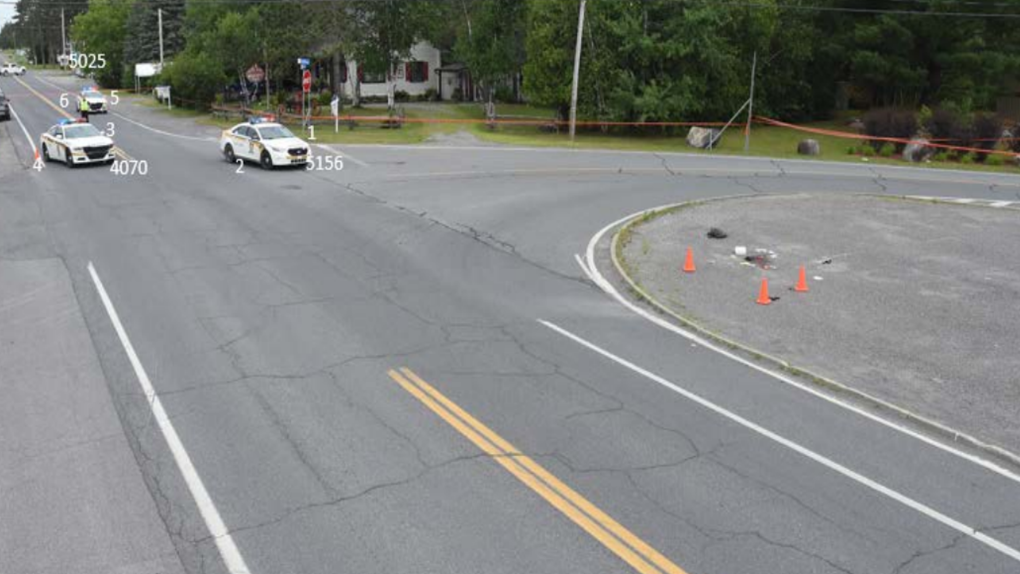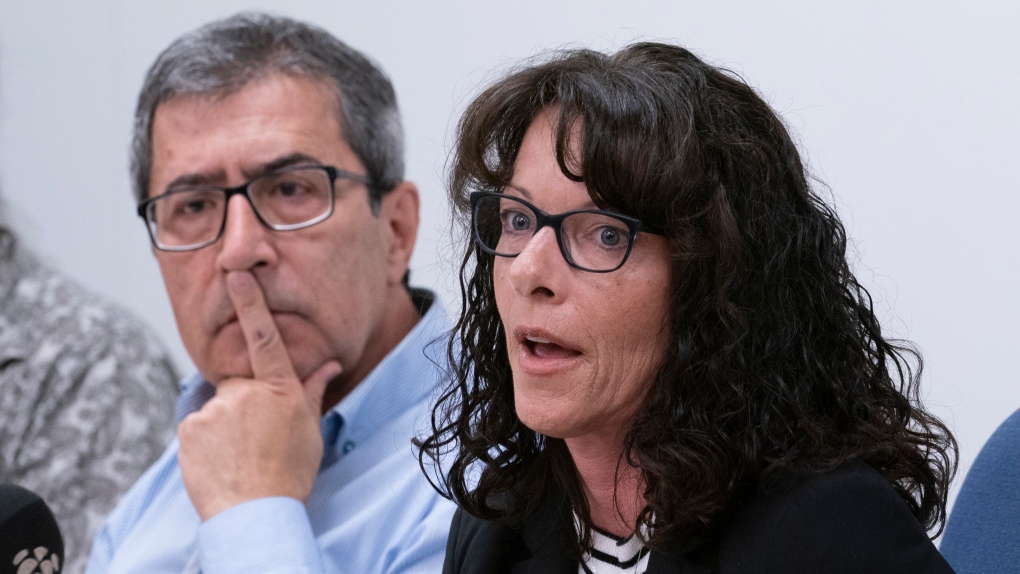Coroner calls for change in policing, health care, education in review of Que. teen fatally shot by police
WARNING -- This story contains details of suicide and depression some may find distressing.
A Quebec coroner has released her final recommendations to police, the health-care system and schools four years after officers shot and killed 17-year-old Riley Fairholm, who called 911 on himself.
Among her recommendations, Gehane Kamel called on the department of health and social services to improve communications between health-care providers, and to ensure there are sufficient mental health resources available to English-speaking patients. She also called for more sustained support and follow up.
The report details the final hours of the teen boy's life.
He placed a call early in the morning July 25, 2018, telling police to watch for an armed male, shorter than six feet tall, dressed in black and carrying a backpack. About 20 minutes later, six officers descended on Fairholm in the parking lot of an abandoned restaurant in Lac-Brome, Que.
According to coroner Kamel, police tried to communicate with Fairholm for about one minute, asking him to drop the weapon. He didn't, instead, the report stated "he is in crisis and waves his weapon in all directions."
All six officers drew their weapons, one of them fired, hitting Fairholm. The officers did not try to resuscitate the teen while waiting for the paramedics to arrive. He was brought to a nearby hospital, where he was pronounced dead.
Fairholm's weapon was an airgun. The officer who shot and killed him, Joel Desruisseaux, told the coroner that the officers felt that their lives were in danger because Fairholm wouldn't put his weapon down. The Crown decided not to lay charges against the officers.
 This image, released as part of the coroner's report into the death of 17-year-old Riley Fairholm at the hands of police in 2018, shows the Lac-Brome intersection where Fairholm was confronted by officers after he called 911 on himself to report an armed man in the area. He was carrying a pellet gun at the time he was shot, which according to the coroner, he refused to put down. (Image source: Quebec Coroner)
This image, released as part of the coroner's report into the death of 17-year-old Riley Fairholm at the hands of police in 2018, shows the Lac-Brome intersection where Fairholm was confronted by officers after he called 911 on himself to report an armed man in the area. He was carrying a pellet gun at the time he was shot, which according to the coroner, he refused to put down. (Image source: Quebec Coroner)
A STRUGGLING TEEN 'LEFT ALONE': CORONER
The coroner's inquiry reveals Fairholm had struggled for several years with major depression and a consistent risk of suicide.
Kamel wrote that, despite being seen by several health-care professionals and prescribed appropriate medication, follow up and sustained support was lacking.
"If a child needs a village to support him in his difficulties, Riley and, dare I say, his parents, have been left alone," she said. "It is not enough to assess and medicate a person to ensure safe follow-up."
Fairholm first notified his doctor that he was experiencing recurring headaches in 2015, three years before he was shot. His mother, Tracy Wing, also expressed concerns around Fairholm's changing moods.
His doctor recommended a follow-up with a specialist, indicating in his note that symptoms of depression were present. According to the report, Dr. Normand Chagnon, who had followed Fairholm since birth, wrote in French "possibilité de MAB" – meaning "possiblity of bipolar affective disorder."
He was then seen by a psychologist, Dr. Anna Beth Doyle, a handful of times before Fairholm’s family decided to end the sessions. Dr. Chagnon, however, was not aware of this, and the two doctors had not communicated beyond a status report sent to Chagnon after preliminary visits. Dr. Doyle had been interested in the possibility that Fairholm was suffering from ADHD.
In 2018, Fairholm was seen by neuropsychologist Dr. Sylvain Boucher, who wanted to examine how the teen's history with head injuries could have given way to anxiety-depressive symptoms. He also noted Fairholm expressed photo and sonophobia, which are also associated with head trauma. He submitted a report to Chagnon advocating for neurofeedback training. Around the same time, Fairholm had suffered a concussion while playing rugby, and the training was put off.
That was the last time Dr. Boucher was involved with Fairholm.
Boucher had also advocated for Fairholm to be put on medication, and Chagnon prescribed Wellbutrin, the brand name for antidepressant Bupropion.
A psychological autopsy of Fairholm, based on the police report, initial autopsy, interviews with relatives and friends, as well as his medical records, suggests the teen was undergoing "significant distress, a consistent risk of suicide, and all the signs of major depression."
Fairholm was never assessed for suicidal risk.
"Dr. Lesage felt that, in the last few months, there was a real opportunity to change Riley's life trajectory," wrote Kamel in her final report. "Yet, he lamented that despite the ideal presence of multiple caregivers and individuals aware of Riley's difficulties, two months went by without any real change."
"Two months would pass in which Riley would have no follow-up psychotherapy, as suggested, and would not take the prescribed medication," she continued.
"Unfortunately, during the public inquiry, it became apparent that the professionals who had been working with the young man would also not follow up to see how Riley was doing."
 Tracy Wing, mother of Riley Fairholm responds to a question as Cesur Celik, father of Koray Kevin Celik, looks on during a news conference in Montreal on Monday, September 16, 2019. The sons of both parents were killed during separate police interventions. THE CANADIAN PRESS/Paul Chiasson
Tracy Wing, mother of Riley Fairholm responds to a question as Cesur Celik, father of Koray Kevin Celik, looks on during a news conference in Montreal on Monday, September 16, 2019. The sons of both parents were killed during separate police interventions. THE CANADIAN PRESS/Paul Chiasson
POLICE SHOULD HAVE TRIED TO RESUSCITATE
Kamel wrote that she believes, based on police presentations, that officers generally acted as they were trained to. However, there is room to improve that training, she said, especially on mental health response.
Quebec’s national police school, the ENPQ, instructs officers to use deadly force only when “the subject's behaviour leads the officer to believe, on reasonable grounds, that the individual intends or is likely to cause serious bodily harm or death to another person.” Officers reportedly did not know the weapon was an airgun.
Kamel noted, however, that the officers’ contact with Fairholm could not be considered “communication,” since police were unable to hear what he was saying during the intervention.
Quebec Provincial Police Sgt. Wallace McGovern told Fairholm to drop his weapon from inside his car, through a megaphone, which he said was the safest position to establish contact.
He said that he heard Fairholm yell, “I've been waiting for this for five years.” But what else did he say? None of the officers could hear him.
“What if he had shouted ‘help me’ when no one heard him?” wrote Kamel. The mere thought of a potential cry for help is unsettling.”
After Fairholm was shot, police did not try to resuscitate him, as officers considered his death to be “evident.”
An “evident death” in Quebec is strictly defined. For example, when a victim is mummified, or underwent injuries that are virtually impossible to survive.
A paramedic’s prior testimony suggests Fairholm’s death could not be considered “evident” at the scene. However, he said, it’s unlikely resuscitation efforts would have saved his life.
“This gray area remained an unanswered question and, when in doubt, I think (resuscitation) maneuvers should always be provided,” wrote Kamel. “This would have had at least the merit of allowing the family to believe that everything was attempted to save their son.”
She made a formal recommendation that police schools ensure officers understand the prerequisites of “evident death.” She also called on the public security ministry to equip squad cars with enhanced first aid kits.
CTVNews.ca Top Stories

Trudeau promoting backbenchers in sizable cabinet shuffle coming Friday: sources
Prime Minister Justin Trudeau is planning a sizable cabinet shuffle on Friday, and it's shaping up to see several Liberal backbenchers promoted to ministerial posts, sources confirm to CTV News.
Prime minister's team blindsided by Freeland's resignation: source
The first time anyone in the senior ranks of Prime Minister Justin Trudeau's office got any indication Chrystia Freeland was about to resign from cabinet was just two hours before she made the announcement on social media, a senior government source tells CTV News.
'Tragic and sudden loss': Toronto police ID officer who died after suspected medical episode while on duty
A police officer who died after having a suspected medical episode on duty was executing a search warrant in connection with an ongoing robbery investigation in North York, Toronto police confirmed Thursday.
Ontario town seeks judicial review after being fined $15K for refusing to observe Pride Month
An Ontario community fined $15,000 for not celebrating Pride Month is asking a judge to review the decision.
The Royal Family unveils new Christmas cards with heartwarming family photos
The Royal Family is spreading holiday cheer with newly released Christmas cards.
EXCLUSIVE Canada's immigration laws 'too lax,' Trump's border czar says
Amid a potential tariff threat that is one month away, U.S. president-elect Donald Trump's border czar Tom Homan is calling talks with Canada over border security 'positive' but says he is still waiting to hear details.
Who received the longest jail terms in the Gisele Pelicot rape trial?
A French court found all 51 defendants guilty on Thursday in a mass rape case including Dominique Pelicot, who repeatedly drugged his then wife, Gisele, and allowed dozens of strangers into the family home to rape her.
Crowd crush kills 35 children at funfair in Nigeria, police say
At least 35 children were killed and six others critically injured in a crowd crush at a funfair in southwest Nigeria on Wednesday, police said.
Scientists think they know why Stonehenge was rebuilt thousands of years ago
Scientists made a major discovery this year linked to Stonehenge — one of humanity’s biggest mysteries — and the revelations keep coming.


































